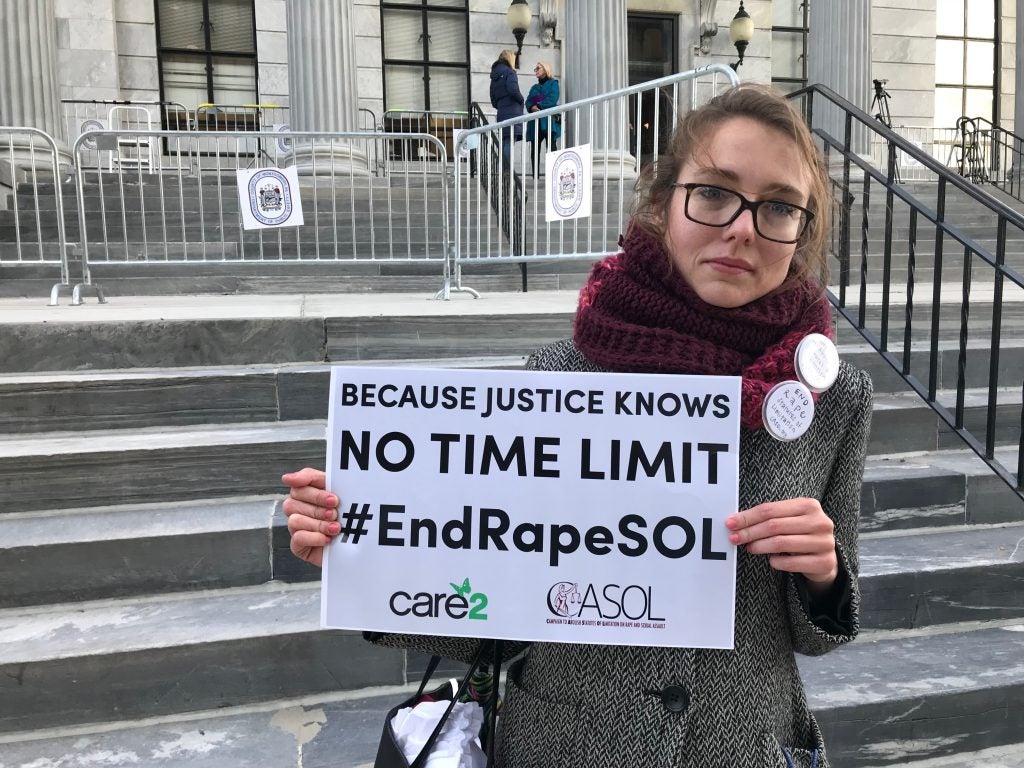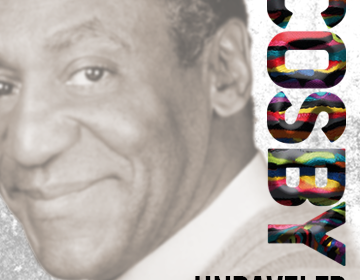Catalyzed by Cosby, advocates aim to end time limits on reporting sexual assault
Comedian Bill Cosby's retrial is underway, and some activists hope the case will highlight their fight to end statutes of limitations on prosecuting sex crimes.
Listen 3:03
Activist Bird Milliken shouts "Women's Lives Matter!" through a bullhorn at Bill Cosby as he leaves the courthouse Tuesday. Millilken and activist Chelsea Byers drove to Harrisburg Tuesday to deliver a petition to lawmakers, demanding they end Pennsylvania's 12-year time limit on how long adult victims have to report sexual assaults. (Dana DiFilippo/WHYY)
Heidi Thomas’ memories of visiting with Bill Cosby three decades ago are fragmented snapshots that flash through her mind; the moments in between are mystifyingly blank.
Snapshot: Waking up in a strange bed, with the naked entertainer hovering over her and forcing himself in her mouth.
Snapshot: Waking again at the foot of the bed, wondering how she got there, with “Mr. C,” as she called him, leering nearby.
Snapshot: Sitting in the passenger seat, as Cosby drove through the Nevada plains.
More disjointed images add up to her horrifying certainty that the comedian drugged and sexually assaulted her at his friend’s ranch outside Reno, where Thomas — then a budding young actress — had gone for career mentoring from the TV titan.
Despite that certainty, Thomas never dreamed of reporting Cosby to police, her talent agent, or even her own parents.
“I just kept thinking: ‘What did I say? What did I do (to lead Cosby on)?’ I just couldn’t come up with anything, but I was pretty sure whatever I had done, it was my fault,” said Thomas, now 58. Besides, she added, in show business, “your reputation is everything. It’s easy enough to be accused of sleeping your way to the top, and it’s horrible if there’s something to back that up.”
By the time Thomas went public with her account of that 1984 night, it was too late to seek justice.
Nevada, where the alleged assault occurred, limited the time victims have to report sexual assaults to four years (lawmakers in 2015 increased that to 20 years). And Colorado, where Thomas lived then (and now), set its time limit, or statute of limitations, for sex crimes at 10 years (increased in 2016 to 20 years).
In fact, most states have statutes of limitations when it comes to sex crimes, allowing victims to bring cases forward anywhere from just one year (Washington) to 30 years (Louisiana). In Pennsylvania, adult victims have 12 years to report.
For years, activists have tried to persuade lawmakers to end these limits, saying sexual assault remains such a stigmatized crime that many victims take a long time to seek justice.
Cosby’s retrial this month — coupled with the context of the growing #MeToo movement — gives activists a spotlight they hope will spur legislative change.
“As we’ve proven in this era of #MeToo, the conditions and circumstances that survivors experience have led to stigmatizing, blaming, and ultimately, silencing of the truth,” said Chelsea Byers, executive director of the Los Angeles-based Campaign to Abolish Statutes of Limitations on Rape and Sexual Assault. “Survivors have no right to due process when the statutes of limitations limit, depending on ZIP code, your potential for justice.”
‘Everybody’s issue’

Byers and activist Bird Milliken, who mounted a musical protest at Cosby’s first trial last summer, road-tripped to Harrisburg Tuesday to give lawmakers a petition with almost 90,000 signatures demanding they end the statute of limitations on sex crimes in Pennsylvania.
“Bill Cosby, (Jerry) Sandusky, happened in Pennsylvania, so much of the Catholic Church’s crimes have come out in the state of Pennsylvania,” Byers said. “All those things together prove that this isn’t just a women’s issue or a children’s issue. It’s everybody’s issue. Men are impacted by this. And right now, silencing is happening because of the justice system.
“We’re not trying to change the burden of proof,” she added. “The burden of proof in evidence still exists. That’s for the courts to decide if there’s enough to move the case forward. But right now, our legal system won’t even let this hit the courts.”
While nearly 60 women have publicly accused Cosby of drugging and sexually assaulting them over five decades, statutes of limitations have kept authorities from bringing charges in all but one case, that of Andrea Constand. She was the director of the women’s basketball program at Temple University, where Cosby was a powerful trustee and alumnus. In 2004, she said Cosby groped her genitals and breast after plying her with wine and pills that left her barely conscious. Cosby’s first trial on aggravated indecent assault charges ended in a hung jury last summer.
Thomas was the first accuser to testify in his retrial, which started Monday at the Montgomery County Courthouse in Norristown. Judge Steven O’Neill is allowing up to five additional accusers, besides Constand, to testify in the retrial.
And Cosby’s defense team seems poised to capitalize on each one’s delay in reporting the alleged assaults. In his opening statement, defense attorney Tom Mesereau suggested Constand’s delay was a deliberate attempt to hide evidence.
“She waited over one year after she claims she was assaulted (to report it), so no one could test whether there were drugs in her system, nobody had any DNA — she made sure no evidence was available,” he told jurors.
On the stand Tuesday and again Wednesday morning, Thomas remained unruffled under cross-examination by Cosby attorney Kathleen Bliss, saying she declined lawyers’ efforts to represent her and never profited from her allegation that Cosby sexually assaulted her. She left show business decades ago to work as a music teacher and pianist.
She lobbied successfully in Colorado to expand the statute of limitations there.
With advocates such as Thomas, Byers predicted more change will come.
“With midterms around the corner, these politicians better be in support of survivors in ways they never have been prepared to do so before — or get out of the way,” she said.
WHYY is your source for fact-based, in-depth journalism and information. As a nonprofit organization, we rely on financial support from readers like you. Please give today.





